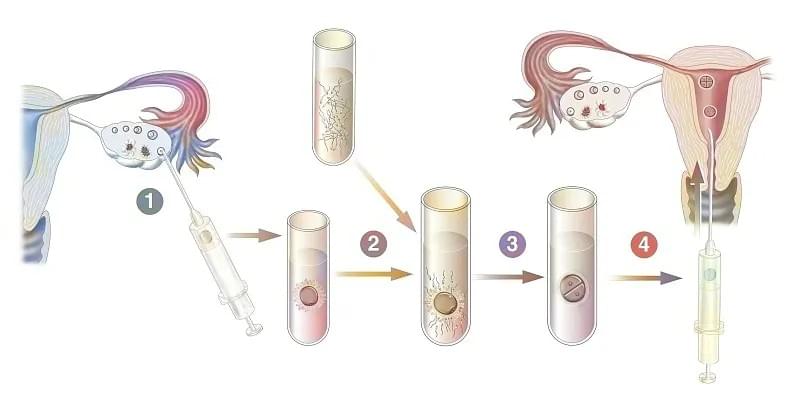For many hopeful parents, the journey to building a family can be both emotionally and physically taxing. In vitro fertilization (IVF) has long been a beacon of hope for couples facing infertility. However, despite significant medical advances, IVF does not always result in a successful pregnancy. When repeated IVF cycles fail, individuals and couples often find themselves at a crossroads, searching for alternative solutions. One increasingly viable and compassionate option is surrogacy. This article explores how surrogacy can serve as a meaningful next step after IVF failure, offering renewed hope and a clear pathway to parenthood.
Understanding IVF Failure: Causes and Emotional Impact
IVF is a complex procedure involving the fertilization of an egg outside the body, followed by the transfer of the resulting embryo into the uterus. While IVF has helped millions of people become parents, success is not guaranteed. According to global fertility statistics, the average success rate per IVF cycle varies significantly based on age, underlying health conditions, and clinic expertise—typically ranging from 20% to 40% for women under 35, with lower rates for older patients.
Repeated IVF failure—commonly defined as three or more unsuccessful cycles—can stem from a variety of factors:
- Embryo quality issues: Chromosomal abnormalities or developmental defects in embryos.
- Uterine receptivity problems: Conditions such as endometriosis, fibroids, or a thin endometrial lining may hinder implantation.
- Immunological factors: The body may reject the embryo due to immune system responses.
- Unexplained infertility: In some cases, no clear medical cause can be identified.
Beyond the physical challenges, the emotional toll of IVF failure is profound. Many individuals experience grief, anxiety, and a sense of loss. The repeated cycle of hope and disappointment can strain relationships and impact mental well-being. It is during this vulnerable time that exploring alternative family-building options becomes not just a practical decision, but a therapeutic one.

Why Consider Surrogacy After IVF Failure?
Surrogacy offers a powerful alternative when the primary barrier to pregnancy lies within the gestational carrier’s ability to carry a child. In traditional surrogacy, the surrogate uses her own egg, but in gestational surrogacy—which is more common and legally straightforward—the embryo is created using the intended parents’ (or donors’) eggs and sperm and implanted into a surrogate who carries the baby to term.
For those who have undergone multiple IVF failures, surrogacy can bypass the specific physiological challenges that prevented a successful pregnancy. For example:
- If the intended mother has a healthy uterus but struggles with egg quality, donor eggs can be used in conjunction with IVF to create embryos, which are then transferred to a surrogate.
- If the issue lies with the uterine environment—such as repeated implantation failure or structural abnormalities—a gestational carrier with a proven ability to carry a pregnancy can offer a higher chance of success.
- In cases of recurrent pregnancy loss due to medical conditions like severe preeclampsia or cervical insufficiency, surrogacy allows the intended parents to avoid the health risks associated with carrying a pregnancy.
Moreover, many fertility clinics now integrate surrogacy services into their reproductive care continuum, making the transition from IVF to surrogacy more seamless than ever.
The Surrogacy Process: From IVF to Gestational Carrier
It’s important to note that surrogacy does not eliminate the need for IVF—it repurposes it. The IVF process remains central to creating the embryo, but instead of transferring it to the intended mother, it is implanted into the surrogate.
Here’s how the process typically unfolds:
- Medical and Psychological Screening: Both the intended parents and the surrogate undergo comprehensive medical evaluations and psychological counseling to ensure readiness and compatibility.
- IVF Cycle for Embryo Creation: Eggs are retrieved from the intended mother or an egg donor and fertilized with sperm from the intended father or a donor. The resulting embryos are monitored for quality and viability.
- Surrogate Preparation: The gestational carrier undergoes hormone therapy to prepare her uterus for embryo implantation.
- Embryo Transfer: A high-quality embryo is transferred into the surrogate’s uterus. This stage is similar to a standard IVF transfer but occurs in a different body.
- Pregnancy and Birth: The surrogate carries the pregnancy under medical supervision. Upon delivery, the baby is legally and physically handed over to the intended parents.
This process allows intended parents to maintain a biological connection to their child while entrusting the physical demands of pregnancy to someone else.

Legal and Ethical Considerations in International Surrogacy
One of the most critical aspects of pursuing surrogacy—especially after IVF failure—is understanding the legal framework. Laws governing surrogacy vary dramatically from country to country. Some nations, like Canada and certain U.S. states, have well-established legal protections for intended parents. Others, including many European countries, either restrict or outright ban commercial surrogacy.
For international intended parents, choosing a destination with a supportive legal environment is essential. Countries such as the United States (in surrogacy-friendly states), Georgia, and Ukraine have become popular due to their clear legal pathways for establishing parentage before birth.
Ethically, surrogacy must be approached with respect, transparency, and fairness. Reputable agencies ensure that surrogates are fully informed, compensated fairly, and supported throughout the journey. Intended parents are encouraged to build a respectful relationship with their surrogate, often resulting in lifelong bonds.
Emotional and Psychological Support: A Vital Component
Transitioning from IVF to surrogacy is not just a medical shift—it’s an emotional transformation. Many intended parents experience mixed feelings: relief at finding a new option, guilt over “giving up” on their own body, and anxiety about the unknown.
Professional counseling is highly recommended throughout the surrogacy process. Support groups, both online and in-person, can also provide invaluable peer connection. Many fertility clinics now offer integrated mental health services to help couples navigate this transition with resilience and clarity.
Additionally, involving the surrogate in a respectful and communicative manner can enhance the emotional experience. Openness—within agreed boundaries—can foster trust and reduce anxiety for all parties involved.

Success Rates and Future Outlook
Studies indicate that surrogacy success rates are often higher than repeated IVF attempts, particularly when the cause of infertility is related to the uterine environment. According to data from the Society for Assisted Reproductive Technology (SART), gestational surrogacy cycles have a clinical pregnancy rate of approximately 50–60% per transfer, with live birth rates around 45–50%.
As reproductive medicine continues to advance, the integration of genetic screening (PGT-A), improved embryo culture techniques, and better surrogate matching algorithms are further increasing the likelihood of a healthy outcome.
Moreover, growing societal acceptance and evolving legal frameworks are making surrogacy a more accessible and normalized option for family building.
Conclusion: Embracing a New Chapter
IVF failure does not mark the end of the road to parenthood—it can be the beginning of a new and equally meaningful journey. Surrogacy offers a scientifically sound, emotionally fulfilling, and legally viable path forward for those who have faced repeated IVF setbacks.
By understanding the reasons behind IVF failure, recognizing the benefits of surrogacy, and engaging with ethical, professional support systems, intended parents can move forward with confidence and hope. The dream of holding a child in your arms remains within reach, even if the path takes an unexpected turn.
For those considering this option, the first step is a conversation—with a fertility specialist, a surrogacy agency, or a counselor. With the right guidance, surrogacy after IVF failure can transform heartbreak into the joy of parenthood.

